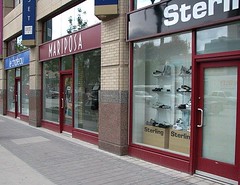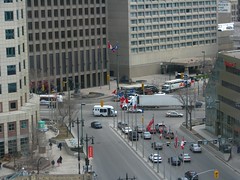Portage Avenue 1976 and 2007
There was an interesting MinnPost.com post back in 2007 about Minneapolis' skywalk system.In 2007 Minneapolis hosted the International Vital Winter Cities conference and a couple of world renowned architects were invited to take a tour of Downtown Minneapolis and give their impressions. One thing they both agreed on ? Get rid of the skywalks ! An excerpt:
The biggest problem, both said, is that people in Minneapolis don't realize that great cities — even cold cities — are now defined by the vitality of their street life. "People here don't see a crisis," said Gehl. "They don't yet see themselves as behind the times."
Earlier this year Architecture Minnesota Magazine held a video competition to show what life would be like in Minnie without the skywalks, or at the very least how to improve them.Canada, in general, tends to be a decade behind the U.S. when it comes to bad urban trends (and Winnipeg a few years behind that).
For instance, the idea that downtown malls could combat urban decay reigned in the U.S. through the 1970s and came to us in the 1980s. In the past few years a number of cities have realized that the downtown mall was a bad idea and centres such as Columbus, Rockford, Green Bay, Sunnyvale, Cleveland and Salt Lake have been demolishing theirs inf favour of, well, what used to be there: storefront offices and shops, smaller scale projects that are walkable and comfortable.
We're nowhere near that point on malls so any discussion about whether elevated skywalks are good or bad for a downtown will take years to reach us. After all, we're still proudly expanding our system with plans to add more.
One aspect of a walkable downtown that will come up for debate in the next couple of years, like it or not, will be the possible reopening of Portage and Main to pedestrian traffic.
Perhaps then we can begin to make amends for decades of building projects that take people off the streets.

















4 comments:
Great post.
Personally, I see malls and skywalks as two different things. Winnipeg's downtown malls are generally failures and it's hard to argue that we're any better off for having them around.
But skywalks, on the other hand, are an important amenity in a city that gets as cold as this one does. A basic network like the one that exists makes downtown more liveable, and gives people one more reason to go there in the winter months. Even if all of the skywalks closed tomorrow, I doubt we'd see any kind of proliferation of streetfront businesses as a result. I suspect a lot of people would respond by simply going someplace that's more comfortable - that could more than offset any increase in the number of pedestrians on the sidewalks.
I can live with putting the brakes on expanding the skywalk system beyond the basic network that exists, and I'd be happy to see Portage and Main opened up. But I would hate to see existing skywalks removed.
Not sure I agree that abolishing the skywalk system is a good idea either. They're a basic necessity on those
-40 January days.
I would like to see those Portage Avenue clunkers redesigned and rebuilt, however. Get rid of the shops, make them them light and airy, and design them so that they won't be architecturally dated 5 years after construction.
Great post, because I think it reinforces the arrogance of the conventional planning community, which talks endlessly about organic solutions but then tries to impose its own cookie-cutter trends and mantras on otherwise innocent cities.
Minneapolis works. The downtown I saw in 2008 seems to be doing just fine with its skywalk system in a downtown that is itself doing pretty well.
So what if they "don't see themselves as behind the times?" What an ass. Oh, the horror - a city that's doing well, yet that isn't conforming to scripture or dogma!
I personally try to use the streets instead of the skywalks as much as possible in order to do my bit to add to street-level foot traffic.
I accept that the skywalks will survive for the time being though, by virtue of the fact that change is ten times more difficult to sell than continuing on the same trajectory.
But as more immigrants pour into our city and more Winnipeggers break out of the insularity of North America -- traveling more adventurously than just the traditional domestic/U.S. trip or outside of the over-protective cruise/resort package -- I'm hoping that attitudes and even our very culture will incrementally change toward something more supportive of street life.
Post a Comment